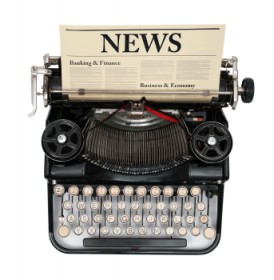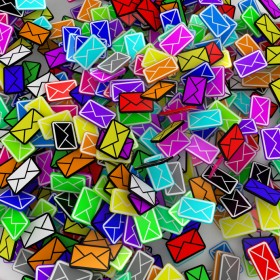The key is not to prioritise what’s on your schedule but to schedule your priorities.
Stephen Covey
You decided not to allow the arrival of each new email to distract you and instead deal with them in batches. What is the best way to manage your time when dealing with email is a question I am often asked. The most important decision is how much time to allocate before suffering email overload. Fifteen to sixty minutes is a good yardstick. Be ruthless and don’t just keep going, otherwise other important tasks will not be done.
You may need to make a meeting with yourself to deal with your email. If you have a day of meetings you will need to deal with them in the margins.
The key is to review and prioritise, based on the email’s subject-line, and decide what is either urgent or important and deal with
these first.
2. Pomodoro. Allocate a specific block of time which you then break up into smaller chunks, traditionally of 25 minutes.

Pomodoro – Email Overload Time Management
(Smaller chunks also work.) Take a five minute break between each chunk and mark up your progress (eg 10 emails actioned and foldered out of the 30 which need attention).
Invented by Francesco Cirillo (a German designer) he called it Pomodoro because he used a tomato shaped timer and pomodoro is the Italian word for tomato. Keeping check on your time is essential with a conventional watch, Pomodoro timer (but might annoy colleagues) or an app. Click here for a review of some good apps and more help in using the technique.
3. Salami Slicing. Excellent when faced with a chronic attack of email overload. As the name suggest, slice the seemingly impossible task of reaching inbox zero (or at least a clean inbox) into much smaller achievable tasks which can easily be done in little blocks of time often 20 minutes. For example, dealing with meeting invites, responses to requests for information, approvals etc. You can now use the Pomodoro technique to help you.
Which ever technique you adopt, be careful not to leave a seemingly unimportant email which then become both important and urgent as this is a recipe for stress and disaster.
For more tips and advice on time management to prevent email overload see ‘Taking Control of Your Inbox’ or come on one of Mesmo Consultancy’s Brilliant Email Management workshops.
Tags: Alan Lakin, email overload, Mesmo Consultancy, Pomodoro, Salami Slicing time management, Swiss Cheese time management, Taking Control of Your Inbox
Two must reads for all managers and directors concerned with effective use of technology (and especially email) to improve the bottom line of their business regardless of size.
2. Is technology really helping us get more done? Twenty years ago it was predicted that new technology would help improve productivity. Now suffering acute email overload and swamped with social media alerts, most office workers feel far less effective. What went wrong? Metcalfe’s law says that value of technology increases with the square of the number of users. But the dark side of this law posits that as the cost of communications decreases the number of interactions increases exponentially as does the time to process them. Have we reached the tipping point?
And for those responsible for well-being
3. The best temperature for a good night’s sleep. The article reinforces the importance of switching off all digital and mobile devices too. A subject we have discussed before.
For the technology minded readers
4. Smartphone typing apps – a review of some of the more useful app and especially in the light of Microsoft’s take over of SwiftKey. For Android users only see this CNET review.
Remember though that using a smartphone does not excuse you from sending email PEARLS rather than lead balloons which can destroy you and your business.
Tags: cyber crime, email overload, Email PEARLS, Productivity, well being
 The English language is complicated enough for those who did not learn Latin at school. Spell and grammar checkers are hailed as tools of the digital age which should make our lives easier. However, they are useless at picking up on the errors generated by using Homonyms. These are words which sound the same but are spelt differently. Here are some examples.
The English language is complicated enough for those who did not learn Latin at school. Spell and grammar checkers are hailed as tools of the digital age which should make our lives easier. However, they are useless at picking up on the errors generated by using Homonyms. These are words which sound the same but are spelt differently. Here are some examples.
How often have you said you will arrange a meeting in mourning (for whom) when naturally you mean the morning? Certainly as one who struggles with mild dyslexia I have made many errors despite emails being be read on screen and paper and spell checked.
As if this is not enough, there are the Homophones, those words which sound and are spelt the same but have different meanings. These are so well illustrated by Lynne Truss’s book ‘ Eats Shoots and Leaves’. Surely a must for anyone who is either a grammar pedant or cares about their email etiquette. One of my favourite Homophones is ‘Rose’. For example:
Are we planting a rose before our partner rose from bed because they drank too much rose coloured wine last night?
There have been several articles recently about the importance of grammar in business and some have suggested that better grammar is linked to how high you climb the corporate greasy pole.
What is clear from Mesmo Consultancy’s studies is that grammatically correct emails help reduce email overload because they convey the right message right first time. Additionally, good email etiquette as in good grammar conveys a professional image and most importantly make it easy for the recipient to know what is being asked of them.
Next time before hitting send, pause, take the slow email approach and re-read before hitting send. Make sure the human touch pervades over the arrogance of the spell checker.
This is an edited extract from my new book Taking Control of Your Inbox due out in late November. Watch this space for more news.
Tags: Dr Monica E. Seeley, email etiquette, email overload, Executive Secretary, Grammar, Lynne Truss, Mesmo Consultancy, Slow email, Taking Control of Your Inbox
 The holiday period was to some extent dominated by the Ashley Madison hacking and the havoc is wrecked for both organisations and individuals as summarized in this months blog and the on-going saga of Hilary Clinton’s emails sent on her personal account. In between there was a piece we noted about Finland now teaching keyboard skills rather than cursive (joined-up) writing.
The holiday period was to some extent dominated by the Ashley Madison hacking and the havoc is wrecked for both organisations and individuals as summarized in this months blog and the on-going saga of Hilary Clinton’s emails sent on her personal account. In between there was a piece we noted about Finland now teaching keyboard skills rather than cursive (joined-up) writing.
The Ashley Madison story
Hilary Clinton email saga
The keyboard overtakes cursive writing
Tags: Ashley Madison, Cursive writing, email overload, Hilary Clinton, pen and paper, thank you emails
Is email yesterday’s technology and will email overload soon be a thing of the past? Maybe for Generation K – teenagers. However, four recent studies on email overload and email traffic suggest that this is definitely not the case see below.

Email overload
1. Email alert: full inboxes leave staff exhausted. Professor Cary Cooper pronounced that email is sapping the life out of the British workforce. It is one reason why British productivity is the lowest in the G7 group. Germany and France are taking action to reduce the email overload malaise, but few UK based companies are doing anything. Sir Cary says ‘companies need to take drastic action’.
2. Here are some of the findings from a fascinating new study of the email behaviour of over 2 million users by a group of researchers at Yahoo and the University of Southern California.
2. The overall volume of emails sent and received is predicted to grow by 3% year on year between 2015 and 2019 according to the Radicati Groups latest email statistics report. This may be a small increase but nonetheless it is still up rather than down.
3. Pointless emails are common. A study focused on British email users (by Sennheiser) found that of 2,000 business users one third felt there was always someone in their team who sent pointless emails (eg the photo copier is broken) when an alternative more effective method could be used. 38% confessed to sending an email which started an email war and 25% said they used email instead of talking because they were emailing about a person sitting close by!
Even if you only receive half the number of emails identified in these studies that is 50 per day and 10,000+ per year. If you are a manger the volume will be higher and the email overload more pronounced.
There are important lessons to be drawn from these studies, not least about email etiquette, the risk of missing important emails as email traffic increases and the impact of email overload on business and personal productivity and finding key emails when needed to support your reason for actions taken.
Simply banning email is not a solution as the Grossman Group pointed out. The solution is to change the email culture and enable people to use email more responsibility. Know when to stop an email chain and talk, no reply is required, etc.
These are challenges which Mesmo Consultancy regularly addresses in its email management training webinars, workshops and one-to-one coaching. If these are issues you face then why not call us now to hear how we have helped other clients like you?
Tags: Cary Cooper, email etiquette, email management training, email overload, Generation K, Generation X, Generation Y, Mesmo Consultancy, Millenials, Radicati Group, Sennheiser, The Grossman Group, University of Southern California, Yahoo